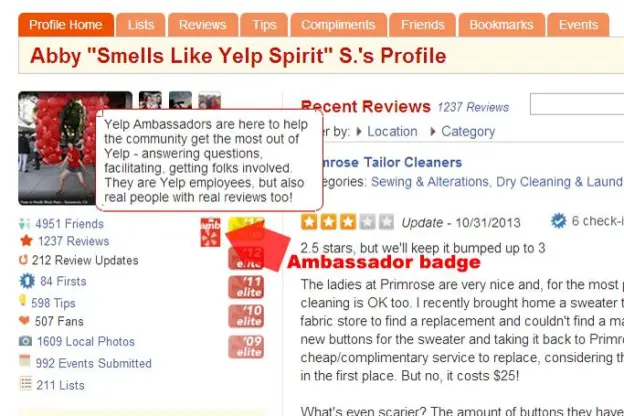
Every time you look for restaurants, stores, services, or products most of us head straight to the Internet. We want to know what other people are saying about these things. Yelp is one of the most widely-used consumer guides on the Internet today – look up taco places in your vicinity and almost immediately find out which one is the best, based on the number and quality of reviews received from members of the site, people who voluntarily take time out of their busy schedules to provide insight to new future customers who might need it.
But now a group of users claiming to have been employed by Yelp for writing these reviews are suing the company, “[seeking] to recover unpaid compensation.”
“Yelp earns its income by selling advertising on its site, the content of which is created free-of-wages by hordes of solicited posters, in violation of the Federal Labor Standard Act,” the complaint read. It also claims that the company’s use of words like “reviewers,” “Yelpers,” “independent contractors,” “interns,” “volunteers,” or “contributors” to describe its users is nothing but a “cult-like rewards and disciplines” system devised by Yelp so it can skate around paying for work that they need in order to keep the entire business model running.
Vine members may have soon-to-be-released products sent to you – the only requirement is that you review it and maintain sole use of it.
This isn’t the first time a suit like this has been filed against a big-name online company. Back in 2011, Huffington Post endured a class action lawsuit filed against them by a group of writers led by former HuffPost writer Jonathan Tasini, claiming they weren’t getting paid for the stories they’d written for the site. Huffington Post gives bloggers the freedom to write about anything they want, but they don’t get paid for the content they produce for the site because they have in their employ reporters and editors who actually have contracts detailing the rules they need to follow and responsibilities they need to fulfill. TechDirt reported that the judge was quick to call the suit frivolous and implied that Tasini’s lawsuit was probably driven by the fact that Huffington Post had just been acquired by AOL for a whopping $315 million.
While the HuffPost cases didn’t fall in the writers’ favor, there are online publishers and reviewer platforms that reward users for reviews. Amazon has Vine, a by-invite-only program available to the most highly rated reviewers on the site. As a Vine member, you may have soon-to-be-released products sent to you, and the only thing required is that you review it and maintain sole use of it. According to Amazon’s Help page, any review written as part of the program is always labeled “Amazon Vine Review” on the product page and “Customer review from the Amazon Vine Program” when you read the review in its entirety.
And this setup is extremely similar to the Yelp Elite Squad, a group of top-rated users that have been nominated and chosen based on “well-written reviews, great tips on mobile, a fleshed-out personal profile, an active voting and complimenting record, and playing nice with others.” The only difference is the fact that nowhere on the FAQ page does it explicitly say that Elite Squad members are to be sent free things. In fact, accepting freebies in exchange for a review is highly discouraged. The closest Yelp has to having paid reviewers are Yelp Ambassadors, who are official employees that also write real reviews. (Elite Yelpers do, however, get to enjoy many perks, like parties and events.)

I asked Yelp a couple of questions pertaining to the requirements of being an Elite Squad member and what happens if a member fails to meet the standards mentioned in the FAQ (quoted earlier), and here’s what I have been able to gather from Rachel Walker, Yelp’s Senior PR Specialist:
1. There is no set number of reviews required from Elite Squad members. The only standard requirement as far as they are concerned is that Elite Squad members be role models “who embody the spirit of [the Yelp] community – both online and off – and write useful, funny, and cool reviews.”
2. A community member may lose their Elite Squad membership “if they decide not to stay engaged on the site and with the community.” The only repercussion of this is that they will lose their Elite badge on their profiles and they will no longer be able to attend Elite events planed by the local community manager (AKA Yelp Ambassador) in their city. They still have the same ability to share reviews, interact on the site, and attend events as regular Yelp users.
3. Elite Squad members do not get compensated or paid for their activities on the site and are completely voluntary. “Elite Yelpers do get access to Elite-only Yelp events, which are planned by the local community manager and are usually free. These events are designed to introduce passionate locals to great local businesses, and, in turn, give those local businesses more exposure to their community.” Additionally, all Yelp users have the opportunity to receive Compliments from other users as well as themed votes for their reviews.
4. Yelp community managers are paid employees. They are situated in cities around the world across the 23 countries where Yelp has a presence. “Their role is to connect the local community, both online and off. They host fun events, write a weekly newsletter, educate business owners on the free tools available on the site, and more. They do write reviews about their experiences with local businesses as well.”
I also tracked down an Elite Yelp member, Ophelia Yan. She’s been an Elite member for about two years, and has written around 170 reviews since she joined. She says she hasn’t heard of people getting kicked out of Yelp because of the reviews they post, and she’s never received free products from anyone in exchange for a good review. “Sometimes events are held with free food and beverage at a business, but we are clearly instructed NOT to review that business based on that event or experience,” shares Yan. “You have to go again on your own before reviewing.”
When asked what she thought of the class action lawsuit against Yelp, she says it doesn’t really matter to her. “I write reviews because I enjoy using them and I find them helpful. I look at it like the ‘give a penny, take a penny’ dish. If you don’t contribute, the resource gets stale and you’re relying on others to keep it going.”
While Yan’s report of the service paints a rather positive picture, a few of the claims in the lawsuit stand out. Yelp is accused of keeping quotas for Elite members (which, does sound to be true according to Walker’s description of how someone can lose their Elite status), and punishing reviewers for writing negatives reviews of sponsors. There’s also a piece in the legalese describing how Elite Yelpers can be fired – though this could just again be what Walker said regarding an Elite Yelper losing their Elite status if they aren’t as active in the community.
It’s difficult to give any merit to this case; on the surface it sounds like a few Elite members’ skills have gone to their heads and are overvaluing what they do. At the same time, Yelp has had to wage a war on skepticism around various parts of trickery regarding its business model; how posts are promoted or buried, whether users are fake or not, and there’s also the never-ending fight to stop business from hiring people to write glowing reviews. But this all comes with the territory: When you build a business model off of people willingly creating and giving you data, at some point (perhaps when it’s becoming well known how valuable a platform is, and thus their data is), some of them are going to start demanding something in return.
